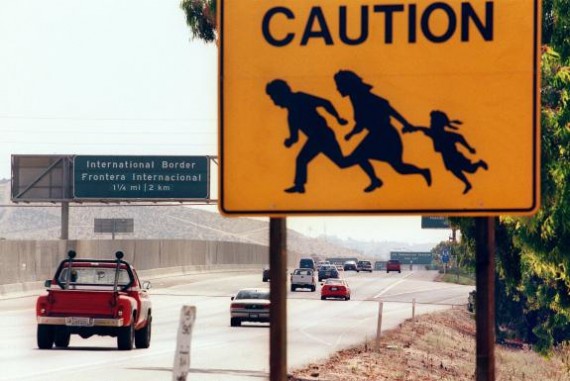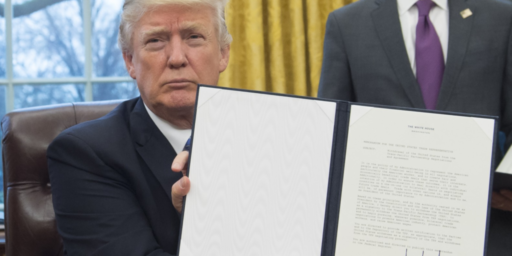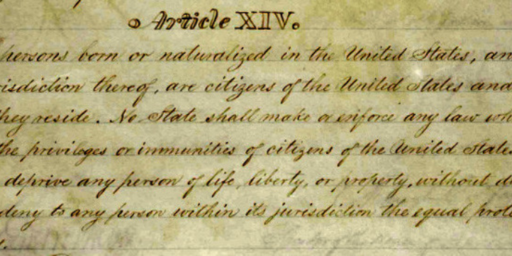An Implication of Removing Birthright Citizenship
Wherein only one of the various consequences of altering the current status of birthright citizenship is considered: more paperwork for us all.
 Let’s consider one* of the consequences of altering our current 14th Amendment-based system of birthright citizenship, whether by altering the the interpretation via the courts or via amending the constitution.**
Let’s consider one* of the consequences of altering our current 14th Amendment-based system of birthright citizenship, whether by altering the the interpretation via the courts or via amending the constitution.**
To wit: if we try to deny citizenship to the children of persons illegally in the country, then all of us, even those whose descendants sailed on the Mayflower, will have to have evidence proving not just our own place of birth for purposes of things like passports, but our parents’ legal status at the time of that birth as well.
First, this would become a big hassle for all of us. Need a passport? Well, just send a certified copy of your birth certificate (or, God help us all, Certificate of Live Birth), plus copies of those of your parents (or copies of their green cards, citizenship papers, whatever the case may require) along with your fees and other paperwork.
Second, consider the increased need for bureaucrats to deal with these requests and the cost to both government in terms of providing the infrastructure needed to handle all those requests along with the fees we will all have to pay as we seek to prove that we are, in fact, citizens born of legal residents.
What if, for some reason, I can only prove that I was born in the US, but cannot prove my parents’ status? Am I then a man without a country? Will I have to have a hearing to prove my status?
Also, what of privacy concerns? Will I have to get my parents’ permission to get the needed information? What if we are estranged? At a minimum, such a situation would require more red tape and more bureaucrats.
These kinds of proposals are often met by large swaths of the public with approval because they believe that the new rules will only apply to others, not to themselves. Many people forget, however, that for any document-based system of identity to function, it has to have some level of universal applicability.
On the one hand a little more paperwork never killed anybody, I suppose. On the other, such a move would increase the power of bureaucrats over our lives and create a more complicated process for a variety of issues, including such mundane things as registering one’s kids for public schools. At a minimum it would increase the burden of proof concerning citizenship for all of us.
*I would note that while I understand why many object to birthright citizenship for those whose parents were in the country illegally, I think that the consequences of changing the 14th Amendment create far more problems than such a move purports to solve and the one discuss here is just one, and a relatively minor one at that. Some of the other relevant issues, although by no means all, were touched on by James Joyner in an earlier post on this subject.
**And setting aside for the moment that neither outcome is likely at all as well as ignoring the fact that, on balance, the current discussion by Senator Graham, et al. is nothing more than a cynical political move.






Have you made any sort of comparative analysis of how these things work in the US versus how it works in India, Holland, Sweden or elsewhere in the 84% of the world where citizenship of the child is dependent on the citizenship of the parents?
The consequences you envision seem reasonable, but I wonder how big of a problem it really is. Although I haven’t done the research myself, I suspect that many of those countries have found ways to overcome or minimize these difficulties.
I (strongly) oppose ending birthright citizenship, but it seems to me that if it did happen, it would be going forward. So you and I, by virtue of the fact that we were born before it took place, would be exempt. The only time it would come up for us is when we have children. We could have to prove our citizenship so that our kids will have citizenship, but I imagine from the point the amendment passes going forward there will be a way to determine citizenship at birth. Most likely having to do with the other thing that occurs at birth, social security numbers. Check the citizenship of the parents by virtue of their social security numbers or, failing that, for a single generation parents may need to get birth certificates. But even so, as long as you are born before X-date in the United States, that’s really all you need. After that, if you have a valid social security number and card, you’re good.
Unless they retroactively revoke citizenship, but I haven’t really heard that proposed. Of course, the whole thing will lend itself to all sorts of fake documentation and fraud, but it’ll still be more restrictive than the status quo. And I don’t think we have to worry <i>too</i> much about them creating giant paperwork hurdles, because people are less tolerant of intrusive government when the intruding applies to them. So I think that there would be a pretty quick and natural pushback.
Your contention is laughable.
The writers of the 14th Amendment specifically prohibited children born in the U S whose se parents were not “subject to the jurisdiction” of same.
This is the problem when one looks at only precedent or worse nothing at all instead of the intent of the writers.
Also, don’t forget that identity theft is a growing crime. The more and more complicated our identification system becomes, they harder it becomes for victims of this crime to recover from it. It’s bad enough now when it basically cuts of your ability to get credit. Imagine a future where it means you now can’t get a job because whenever you apply, your name pops up as one known to be used by identity theives?
@Walt: even if you are 100% correct (whcih, you are not: the clause in question had to do with the children of ambassadors and the like) it doesn’t change one word of what I wrote.
In other words, even if we change the application of the 14th Amendment, the above-described bureaucratic changes would have to be implemented.
So, Steven you think an illegal act should benefit the perps? If you think those that wrote this Amendment and approved it had any idea it would or could be used in this manner, you probably need to refresh you history courses. If a felon cannot benefit from his crime, why is it OK for those who invade our country give birth to a child conceived elsewhere be allow to set that anchor? If you wish to grant citizenship to the child. Fine but put them in foster care and send their parents back to where they came from.
We cannot compare to other countries, Kalim, It is a cardinal rule of American political thought that we are the only country on earth, and housing crises, health care plans, etc., only exist here.
This makes it much easier to say a thing is impossible.
@John: For the record, I am not saying what I am describing is impossible, but rather that I don’t think most supporters of the concept think it will affect themselves at all. They did to assume it will only affect illegal immigrants.
Really, what we would need would be what a lot of other countries have: a true national ID card and a bureaucracy to manage it.
This is certainly doable–the question becomes politically viability.
Steven L. Taylor sez:
That is one of the issues I had with certain provisions of AZ’s immigration bill. It’d potentially affect a whole bunch of American citizens of hispanic descent, along with the illegal aliens it was meant to target. (I’d feel better about even that if only they’d make it check upon arrest, vs check upon contact and reasonable suspicion… I’m not so worried about the additional inconvenience visited upon a hispanic American who’s already being accused and booked for a completely separate crime. He likely wasn’t going anywhere, anyway… Pulling in the guy who made an illegal u-turn and accidentally left his license or green card in his other pair of jeans, however, seems kinda harsh…)
Zelsdorf Ragshaft III sez:
I guess this is the part I never understood. It’s one thing to be a citizen, but it’s another to be guaranteed a life here in America. I mean, if my wife or I are offered a great job in some other country and decide to accept it, our American kids are coming with us (or, if we felt strongly enough about their staying here) staying with relatives or friends. Kids are the responsibility of their parents, and if their parents are here illegally and being deported, I fail to understand why having a child born here makes any difference, for the parents, I mean. Either the child stays with legal relatives or friends here in America, or s/he goes back to the country of her parents, until s/he’s old enough to come on back on her own. (at which point, she can sponsor the parents or other siblings, I guess…)
Obviously, some portion of this works differently than (I think) it should because if we actually did send little American baby Juanita back to the home country of her undocumented parents until she was old enough to take advantage of her American citizenship on her own–not because she’s illegal, but because children belong with their parents, even if their parents don’t live here–I’d think this wouldn’t be as big an issue as it seems to be…
Could this rule be applied in such a way that Barrack Obama is no longer a US citizen? After all, his poppa was not a US citizen?
Don’t we have a program to convert state driver’s licenses into ‘Secure ID’ or some such?
As I understand it, they will become the national id card, in some other name, so that civil libertarians are less offended.
BTW, I don’t think this proposal has any serious path, and agree that it is another Republican do-nothing wedge issue.
I think any country can define their own citizenship rules. It goes with that that any country can redefine them. This puts me nominally in the Republican camp, but I’m not nearly animated enough about it for their wedge issue to be working on me, at least.
“And setting aside for the moment that neither outcome is likely at all as well as ignoring the fact that, on balance, the current discussion by Senator Graham, et al. is nothing more than a cynical political move.”
Why on earth should we set aside or ignore such obviously accurate points, even for a moment?
***As I understand it, they will become the national id card, in some other name,***Mark of the beast?lol…..
A national ID card or document seems to me to be the way ahead. Objections to this are, in my opinion, either silly or are being used as a trumped up issue to defeat the idea. Look to the source of the objections for an answer. Certainly there would be administrative problems with a new ID for everyone, with a lot of past messes to clean up–or not!
There is nothing wrong with exerting some national effort to achieve the benefits of a national ID card. Most good citizens now have a plethora of ID on them, and the databases behind those IDs are becoming very close to having a dossier on everyone, both for public uses and for private uses. If you have ever hired a private investigator in this modern era, you would be shocked at what they can find out without leaving their office. So what real difference does one more make?
A serial number? You have an SSN now.
Ability to find you? You can be found quite readily by the Government if they really want you. Of course, there are criminal exceptions, and I have excluded criminal intent here for the nonce.
You picture accessible? Look at your driver’s license.
And so on…
Manning:
Yeah, I agree. Privacy has become an illusion and a government ID card is the least of our problems.
1. I really don’t think this kind of amendment ever passes. It might get out of congress, but I just don’t see ratification happening-well actually I am not even sure it makes it out of congress.
2. If it did pass, I figure there will probably be a few more hoops to jump through when getting a passport and other documents, but I don’t know that it is going to be that big a burden.
3. I personally wouldn’t object to some kind of national ID card, and in some cases it would make some things easier. Basically I don’t feel the need to get outraged over something like this, although I am also not sure it is necessary. A part of me believes we are heading this way anyway. I guess my objection would center more on what was on it and how it would be used. I am more troubled by how social security numbers which were originally intended to be between the IRS and the holder have become essentially a national ID without the photo as it is-so I would worry about mission creep.
I have no real issues with birthright citizenship. I do think though that if a parent of a minor child who is a citizen is here illegally that minor child should not keep them from being deported. The child should be able to return citizenship in hand when they are adults if they choose. Seems like this is the better option (and honestly are there any good studies on the issue of “anchor babies” as it is)? Are there really that many babies being born here that it is that big of a problem in the midst of the illegal immigration problem?
Please correct me if I have this wrong, but I thought this was created to protect slaves and their children and so on after slavery was abolished? What does this have to do with ppl sneaking into this country and having babies in order to continue to remain here illegally and many times living on welfare? The line has to be drawn somewhere. If these ppl are illegal, then no amount of babies should protect them, ESPECIALLY if overall they depend on welfare assistance. I hear ppl admit they’re illegal status, and then go on to defend it by saying they’ve been in the US for many years working and not breaking the law. They dont see that they are breaking the law and why haven’t they even tried to get a green card? Incredible. There’s no expiration date on being an illegal. They want the benefits but not the responsibility.
I am a staunch civil libertarian, but I advocate a national ID card. I already have a passport I show to get on an airline or go to a foreign country or check into a foreign hotel. I have to show my driver license to get a drink at the ball park. I have to show ID when I cash a check or have a document notarized or get stopped for running a red light. I don’t see the extra loss of privacy in having a national ID card.
It can help get the issue of racial profiling off the table.
Please correct me if I have this wrong, but I thought this was created to protect slaves and their children and so on after slavery was abolished?
It was, but only in part. The amendment also restored citizenship to Confederate soldiers who had renounced theirs. Millions of southerners were no longer legal citizens following the Civil War. Without the 14th Amendment, they would have been stuck in a nationless limbo.
In addition, the amendment was specifically crafted in such a way as to make it completely unambiguous (though they failed in that regard, as they did not predict a bunch of idiots not understanding the word “jurisdiction” 140 years later).
It was well understood at the time that the amendment grants citizenship to the children of visiting foreigners. While the authors may not have been able to predict the difficulties of illegal immigration more than a century later, the authors of the Constitution likewise couldn’t have predicted how advanced weaponry would become when they wrote the 2nd Amendment. So it goes.
They want the benefits but not the responsibility.
Do you understand that most illegal immigrants work and pay taxes, though they are deprived of many of the benefits of those taxes the rest of us receive? In many ways, they have the opposite of what you claim: responsibility without benefits.
One of the more thought-provoking pieces I’ve read from you. Thanks for your take.
<I>Do you understand that most illegal immigrants work and pay taxes, though they are deprived of many of the benefits of those taxes the rest of us receive? In many ways, they have the opposite of what you claim: responsibility without benefits.</i>
Do you understand that when your child gives you the quarter that they earned at their curbside lemonade stand that they’ve now become your equal as a breadwinner for the household?
The vast majority of illegal aliens, and their families, are receiving far more benefits from society than they contribute to society. To pretend that what they pay in taxes makes up for the benefits they receive is like pretending that the lemonade stand income of your child matches the income you bring into the household.